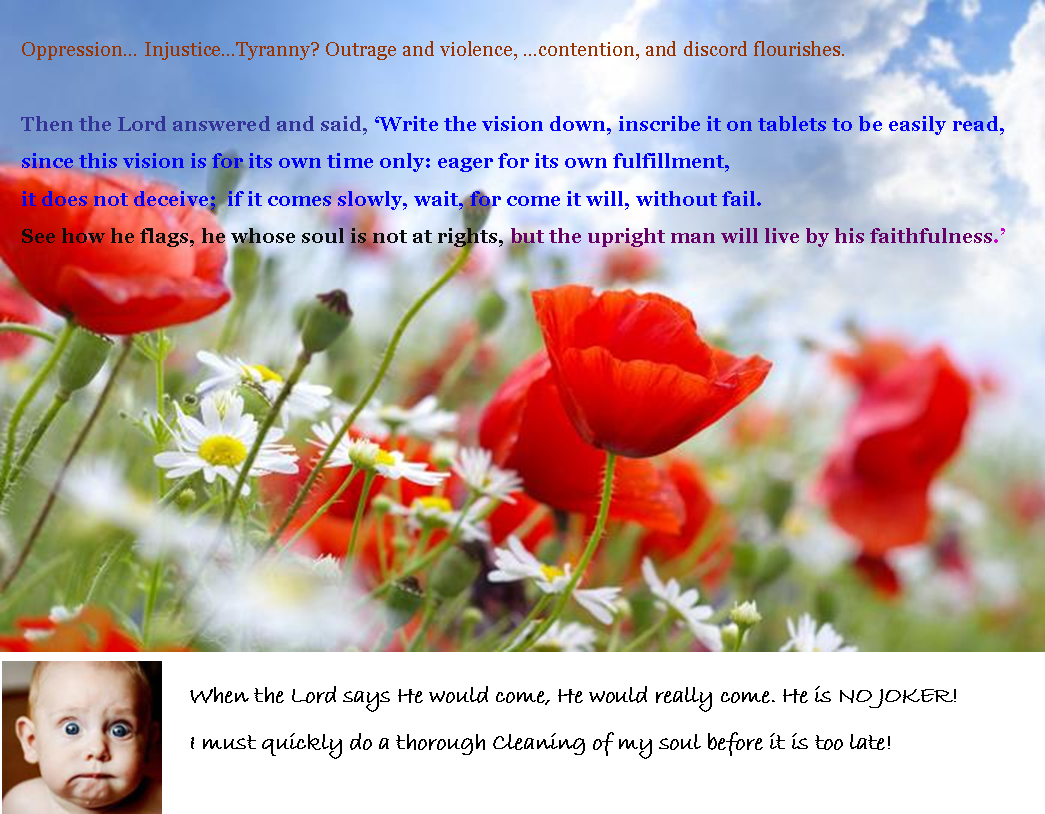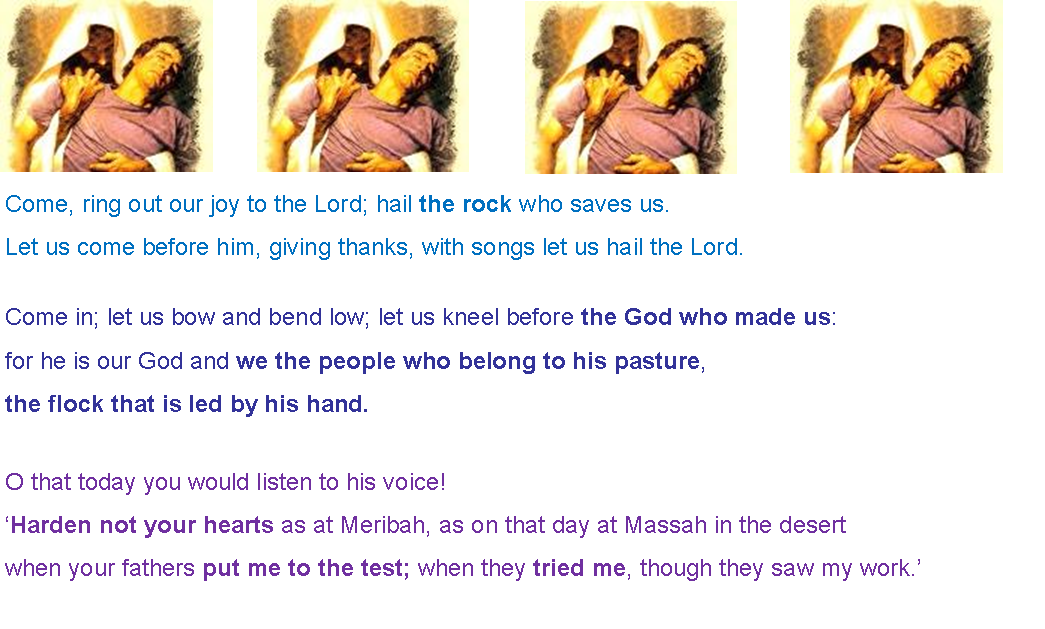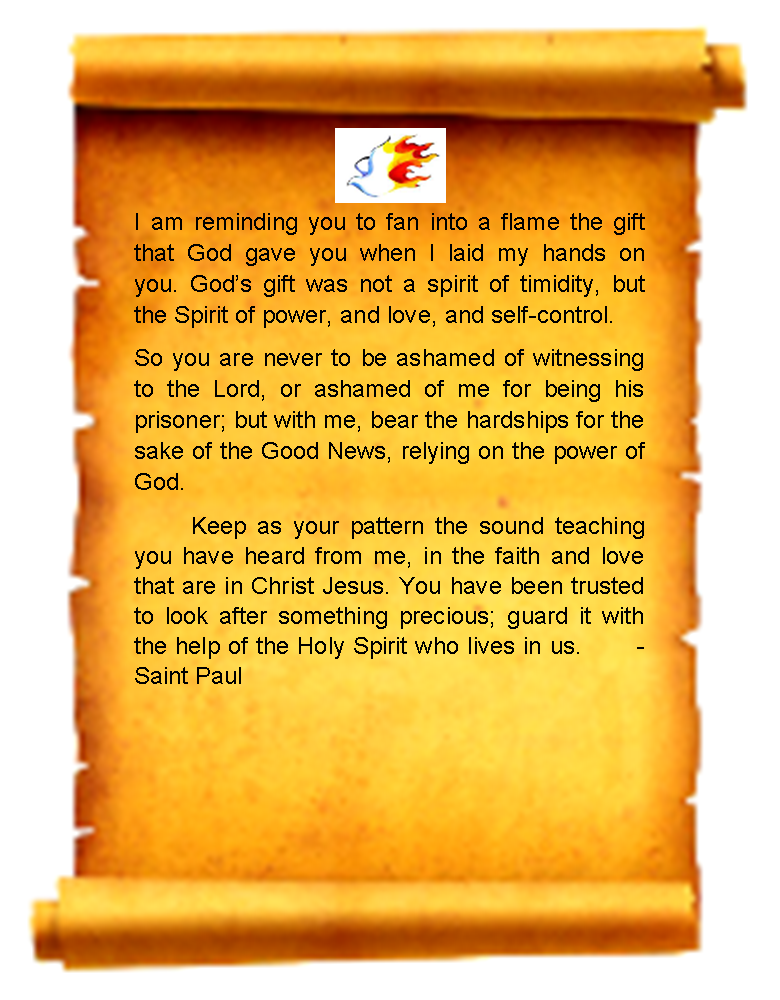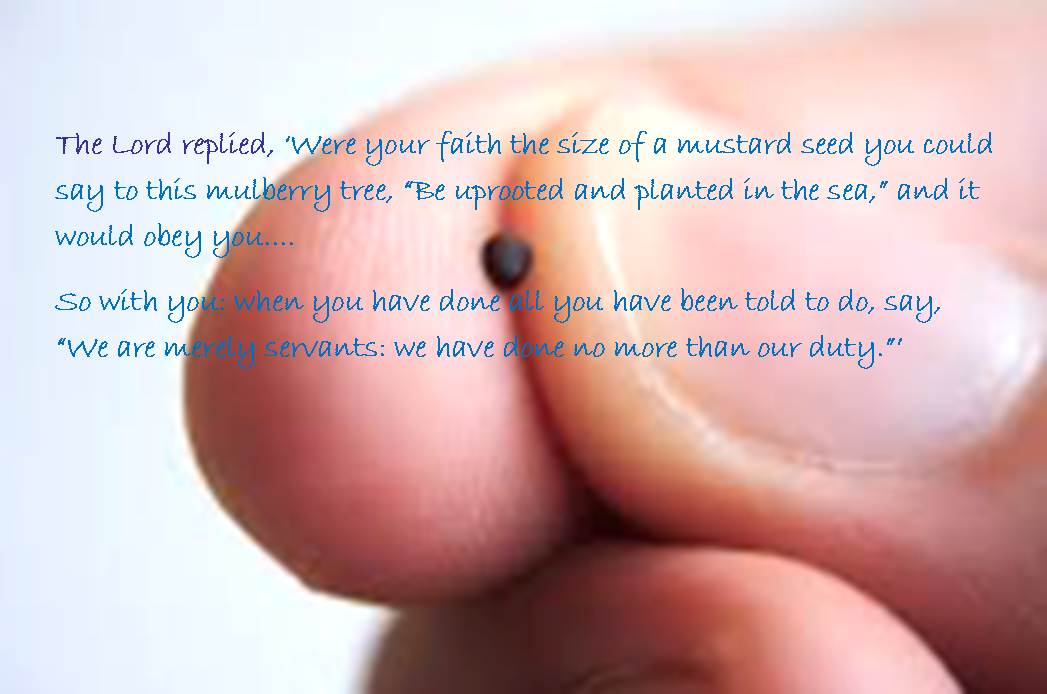|
65 |

|
Extracted from the prophet Habakkuk 1:2-3,2:2-4: How long, O Lord, am I to cry for help while you will not listen; to cry ‘Oppression!’ in your ear and you will not save? Why do you set injustice before me, why do you look on where there is tyranny? Outrage and violence, this is all I see, all is contention, and discord flourishes. Then the Lord answered and said, ‘Write the vision down, inscribe it on tablets to be easily read, since this vision is for its own time only: eager for its own fulfilment, it does not deceive; if it comes slowly, wait, for come it will, without fail. See how he flags, he whose soul is not at rights, but the upright man will live by his faithfulness.’ |

|
Extracted from Psalm 95:1-2,6-9: O that today you would listen to his voice! ‘Harden not your hearts.’
Come, ring out our joy to the Lord; hail the rock who saves us. Let us come before him, giving thanks, with songs let us hail the Lord.
Come in; let us bow and bend low; let us kneel before the God who made us: for he is our God and we the people who belong to his pasture, the flock that is led by his hand.
O that today you would listen to his voice! ‘Harden not your hearts as at Meribah, as on that day at Massah in the desert when your fathers put me to the test; when they tried me, though they saw my work.’ |

|
Extracted from the 2nd letter of Saint Paul to Timothy- 2 Timothy 1:6-8,13-14: I am reminding you to fan into a flame the gift that God gave you when I laid my hands on you. God’s gift was not a spirit of timidity, but the Spirit of power, and love, and self-control. So you are never to be ashamed of witnessing to the Lord, or ashamed of me for being his prisoner; but with me, bear the hardships for the sake of the Good News, relying on the power of God. Keep as your pattern the sound teaching you have heard from me, in the faith and love that are in Christ Jesus. You have been trusted to look after something precious; guard it with the help of the Holy Spirit who lives in us. |

|
Extracted from the holy Gospel according to Luke 17:5-10: The apostles said to the Lord, ‘Increase our faith.’ The Lord replied, ‘Were your faith the size of a mustard seed you could say to this mulberry tree, “Be uprooted and planted in the sea,” and it would obey you. ‘Which of you, with a servant ploughing or minding sheep, would say to him when he returned from the fields, “Come and have your meal immediately”? Would he not be more likely to say, “Get my supper laid; make yourself tidy and wait on me while I eat and drink. You can eat and drink yourself afterwards”? Must he be grateful to the servant for doing what he was told? So with you: when you have done all you have been told to do, say, “We are merely servants: we have done no more than our duty.”’
Sharing:
It was the 27th Sunday in Ordinary Time on 6 October 2013.
Here are the Readings that were read in the Eucharistic Celebrations all over the world on the same day (see above): 1st Reading: Habakkuk 1:2-3, 2:2-4, Responsorial: Psalm 95:1-2, 6-9, 2nd Reading: 2 Timothy 1:6-8, 13-14 & Gospel Reading: Luke 17:5-10.
We have extracted the Homilies of Blessed Pope John Paul II, Pope Benedict XVI & Pope Francis I based on the aforesaid Readings to share with you, so that you could similarly be encouraged:
APOSTOLIC JOURNEY HOMILY OF THE HOLY FATHER JOHN PAUL II 4 October 1998
1. “We are unworthy servants” (Luke 17:10).
These words of Christ surely kept echoing in the hearts of the Apostles when, obedient to his command, they set out on the highways of the world in order to proclaim the Gospel. They travelled from one city to another, from one region to the next, spending themselves in the service of the Kingdom and always taking to heart the admonition of Jesus: “When you have done all that is commanded you, say: 'We are unworthy servants; we have done only what was our duty'” (Luke 17:10).
The Apostles handed on this same realization to their disciples, including those who first crossed the Adriatic Sea and brought the Gospel to Roman Dalmatia, to the people who then dwelt along this beautiful coast and in the other, no less beautiful, lands reaching as far as Pannonia. The faith thus began to spread among your ancestors, who in turn handed it down to you. This has been a long historical process, which goes back to the time of Saint Paul and which had a forceful new beginning in the seventh century, with the arrival of the Croatian people.
Today we want to thank the Most Holy Trinity for the Baptism received by your ancestors. Christianity arrived here from the East and from Italy, from Rome, and it shaped your national tradition. Remembering this evokes a lively and deep sense of gratitude to Divine Providence for this two-fold gift: first and foremost, the gift of your call to faith, and then the gift of the fruits which that faith has borne in your culture and your way of life.
Along the Croatian coast, down the centuries, there arose wonderful architectural masterpieces, which inspired awe in countless people in every age. Everyone could enjoy this splendid heritage, standing out amid the lovely countryside. Tragically, as a result of war, many of these treasures have been destroyed or damaged. The eye of man can no longer rejoice in them. How can we not feel regret for this?
2. “We are unworthy servants; we have only done what was our duty”. Jesus’ words raise questions which cannot be avoided: have we really done what was our duty? And what must we do now? What tasks lie before us? What resources and what forces do we have at hand? The questions are complex and so the answer to them must be carefully thought through. Today we ask these questions as Christians, as followers of Christ, and with this awareness we read the page of Saint Paul’s Letter to Timothy. There the Apostle, listing some of the disciples, also mentions the name of Titus, recalling his mission in Dalmatia. Titus was thus one of the first evangelizers of these lands, singular evidence of the Apostle’s concern that the Gospel should be brought here.
In the words of the aged Paul, we hear an echo of the apostolic concern which marked his whole life. Now, at the moment when he must depart from this life (cf. 2 Tim 4:6), he writes to his disciple: “I have fought the good fight, I have finished the race, I have kept the faith” (2 Timothy 4:7). This is both a testimony and a testament. In this context, Paul’s final words take on greater significance: “The Lord stood by me and gave me strength to proclaim the message fully, that all the Gentiles might hear it” (2 Timothy 4:17).
Those who today, at the end of the Second Millennium, must continue the work of evangelization can draw light and strength from these words. In this work, at once divine and human, we need to call upon the power of the Lord. On the threshold of the new Millennium, we rightly speak of the need for a new evangelization: new in method, but always the same with regard to the truths it proclaims. The new evangelization is an immense task: universal in its content and destination, it must take on new and diverse forms, adapting to the needs of different places. How can we not sense the need of God’s help to sustain our weakness and limitations? Let us pray that the Church in your Catholic nation will be able to see clearly, with God’s help, the challenges and tasks associated with the new evangelization and rightly direct all her efforts, “tertio millennio adveniente”.
3. I thank the Metropolitan Archbishop, Ante Juric, for the words of welcome which he addressed to me at the start of this Eucharistic celebration, in your name and in the name of all the people of good will in this beloved land of Croatia.
I greet the Bishops of the ecclesiastical Province of Split-Makarska and all the other Bishops of Croatia, particularly Cardinal Franjo Kuharic. I also welcome with gratitude the Pastors of the Church in nearby Bosnia-Hercegovina: the Archbishop of Sarajevo, Cardinal Vinko Puljic, with his Auxiliary, Bishop Pero Sudar; the Bishop of Mostar-Duvno and Apostolic Administrator of Trebinje-Mrkan, Bishop Ratko Peric, and the Bishop of Banja Luka, Franjo Komarica. I likewise greet all the other Bishops present.
Finally, I greet the President of the Republic, the Head of Government and the civil and military authorities, who have wished to be present here with us.
4. Dear friends, Split and Solin make up the second and final stage of my Pastoral Visit to Croatia. These two places have a very special significance in the growth of Christianity in this region - from Roman times and, later, Croatian times - and they evoke a long and wonderful history of faith from the time of the Apostles until our own days.
“If you had faith as a grain of mustard seed...” (Luke 17:6), Jesus said just now in the Gospel reading. God’s grace has made that grain of faith sprout and grow to become a great tree, rich in fruits of holiness. Even at the harshest moments of your history, there have always been men and women who have kept repeating: “The Catholic faith is my vocation” (the Servant of God Ivan Merz, in Positio super vita, virtutibus et fama sanctitatis, Rome, 1998, p. 477); men and women who have made the faith their programme of life. So it was for the martyr Domnius in Roman times, so it was also for the many martyrs during the Turkish occupation, up to the Blessed martyr Alojzije Stepinac in our own time.
Continue next page …
13 October 2013 |